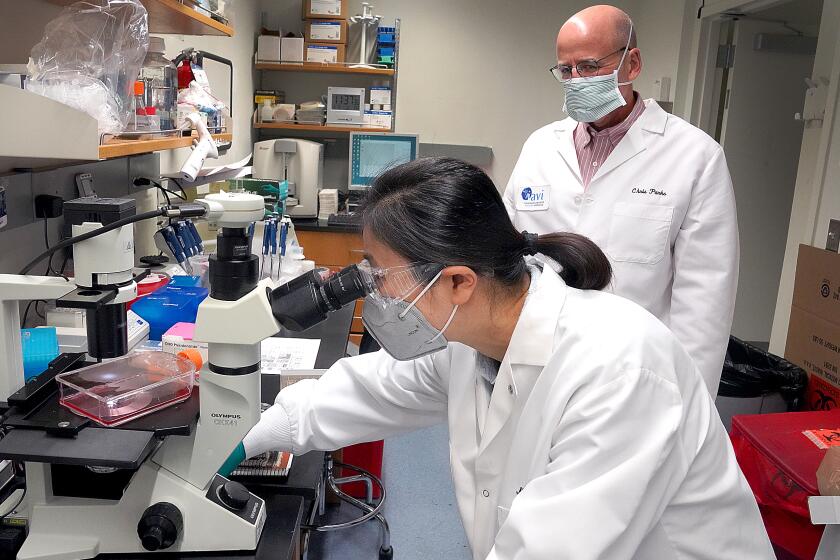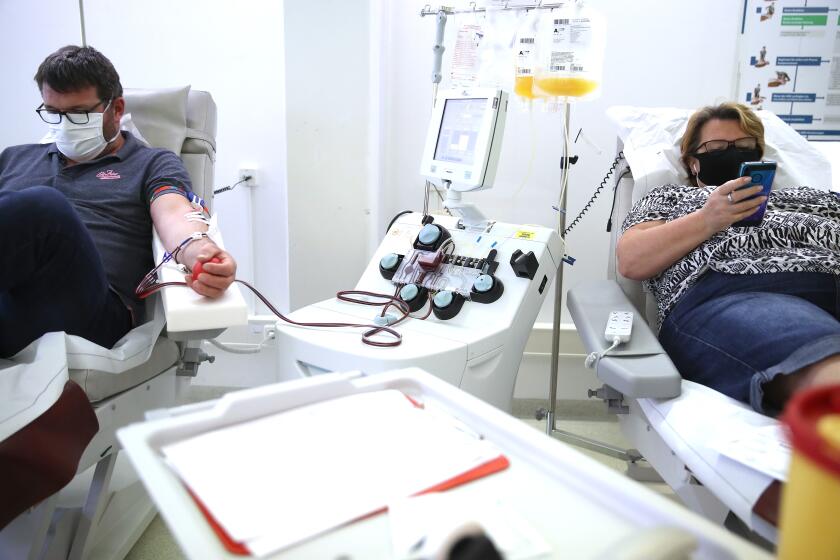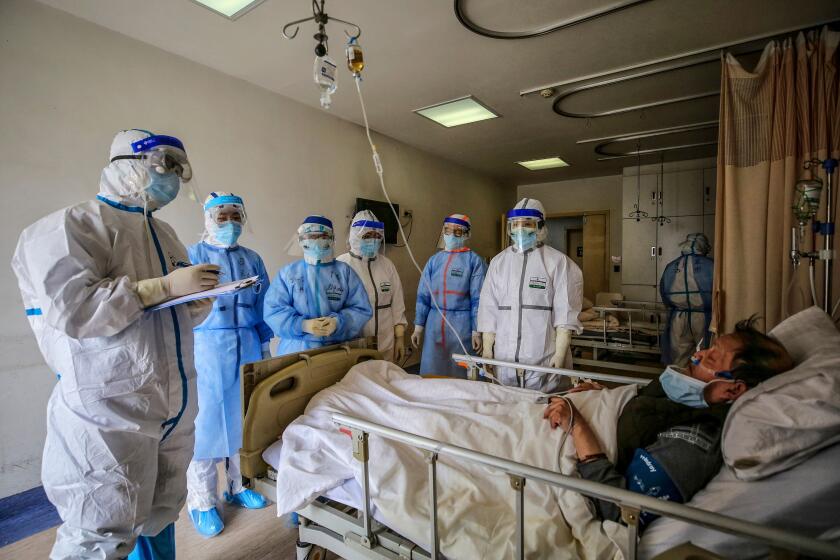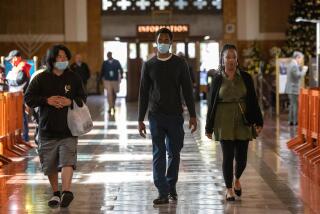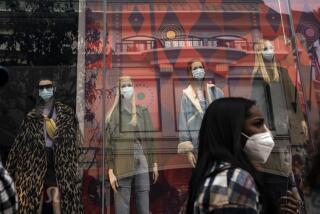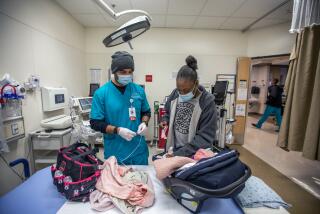‘Breakthrough finding’ offers clues about why certain COVID-19 patients die

- Share via
Dr. Megan Ranney has learned a lot about COVID-19 since she began treating patients with the disease in the emergency department in February.
But there’s one question she still can’t answer: What makes some patients so much sicker than others?
Advancing age and underlying medical problems explain only part of the phenomenon, said Ranney, who has seen patients of similar age, background and health status follow wildly different trajectories.
“Why does one 40-year-old get really sick and another one not even need to be admitted?” asked Ranney, an associate professor of emergency medicine at Brown University.
Provocative new research shows that in some cases, some people — men in particular — succumb because their immune systems are hit by friendly fire. Researchers hope the finding will help them develop targeted therapies for these patients.
In an international study published last month in the journal Science, 10% of nearly 1,000 COVID-19 patients who developed life-threatening pneumonia had antibodies that disable key immune system proteins called interferons.
These antibodies — known as autoantibodies because they attack the body itself — were not found in 663 people with mild or asymptomatic coronavirus infections. In fact, only four of 1,227 healthy individuals had the autoantibodies.
“This is one of the most important things we’ve learned about the immune system since the start of the pandemic,” said Dr. Eric Topol, executive vice president for research at Scripps Research in San Diego, who was not involved in the new study. “This is a breakthrough finding.”
A small lab tries to alter one gene of the coronavirus, hoping that change will offer a way to kill it.
In a second Science study, the same team of researchers found that an additional 3.5% of critically ill patients had mutations in genes that control the interferons involved in fighting viruses. Given that the body has 500 to 600 of these genes, it’s possible researchers will find more mutations, said Qian Zhang, lead author of the second study.
Interferons serve as the body’s first line of defense against infection, sounding the alarm and activating an army of virus-fighting genes, said virologist Angela Rasmussen, an associate research scientist at the Center of Infection and Immunity at Columbia University’s Mailman School of Public Health.
“Interferons are like a fire alarm and a sprinkler system all in one,” said Rasmussen, who wasn’t involved in the new studies.
Lab studies show interferons are suppressed in some people with COVID-19, perhaps by the virus itself.
Interferons are particularly important for protecting the body against new viruses, said Zhang, a researcher at Rockefeller University’s St. Giles Laboratory of Human Genetics of Infectious Diseases.
When infected with the novel coronavirus, “your body should have alarms ringing everywhere,” she said. “If you don’t get the alarm out, you could have viruses everywhere in large numbers.”
In exploring coronavirus immunity as the nation reopens, scientists still want to know how long immunity lasts and whether it protects everyone equally.
Significantly, patients didn’t make autoantibodies in response to the virus. Instead, they appeared to have had them before the pandemic even began, said Paul Bastard, lead author of the first study who is also a researcher at Rockefeller University.
For reasons that researchers don’t understand, the autoantibodies never caused a problem until patients were infected with COVID-19, Bastard said. Somehow, the novel coronavirus, or the immune response it triggered, appears to have set them in motion.
“Before COVID, their condition was silent,” he said. “Most of them hadn’t gotten sick before.”
Scientists have long known that viruses and the immune system compete in a sort of arms race, with viruses evolving ways to evade the immune system and even suppress its response, said Sabra Klein, a professor of molecular microbiology and immunology at the Johns Hopkins Bloomberg School of Public Health.
Antibodies are usually the heroes of the immune system, defending the body against viruses and other threats. But sometimes the immune system appears confused and creates autoantibodies. This occurs in autoimmune diseases such as rheumatoid arthritis, when antibodies attack the joints, and Type 1 diabetes, in which the immune system attacks insulin-producing cells in the pancreas.
Although doctors don’t know the exact causes of autoimmune disease, they’ve observed that the conditions often occur after a viral infection.
In yet another unexpected finding from the first study, 94% of patients with these autoantibodies were men. About 12.5% of men with life-threatening COVID-19 pneumonia had autoantibodies against interferons, compared with 2.6% of women. That was unexpected, given that autoimmune disease is far more common in women, Klein said.
“I’ve been studying sex differences in viral infections for 22 years, and I don’t think anybody who studies autoantibodies thought this would be a risk factor for COVID-19,” she said.
The study might help explain why men are more likely than women to become critically ill with COVID-19 and die, Klein said.
“You see significantly more men dying in their 30s, not just in their 80s,” she said.
Italy announced that coronavirus deaths of men outnumbered those of women by a factor of 2 to 1. That mirrors the experience of China. What gives?
Akiko Iwasaki, a professor of immunobiology at the Yale School of Medicine, noted that several genes involved in the immune system’s response to viruses are on the X chromosome.
Women have two copies of this chromosome — along with two copies of each gene it contains. That gives women a backup in case one copy of a gene becomes defective, Iwasaki said.
Men, however, have only one copy of the X chromosome. So if there is a defect or harmful gene on the X chromosome, they have no other copy of that gene to correct the problem, Iwasaki said.
Bastard noted that one woman in the study who developed autoantibodies has a rare genetic condition in which she has only one X chromosome.
Scientists have struggled to explain why men have a higher risk of hospitalization and death from COVID-19. When the disease first appeared in China, experts speculated that men suffered more from the virus because they are much more likely to smoke than Chinese women.
Researchers quickly noticed that men in Spain were also more likely to die of COVID-19, however, even though men and women there smoke at about the same rate, Klein said.
But behavioral differences between men and women provide only part of the answer. Scientists say it’s possible that the hormone estrogen may somehow protect women, while testosterone may put men at greater risk. Interestingly, recent studies have found that obesity poses a much greater risk to men with COVID-19 than to women, Klein said.
To be sure, scientists say that the new research solves only part of the mystery of why patient outcomes can vary so greatly.
How can the new coronavirus affect people so differently — killing some while leaving others blissfully unaware that they have been infected at all?
It’s possible that some patients are protected by past exposure to other coronaviruses. Patients who get very sick also may have inhaled higher doses of the virus, such as from repeated exposure to infected co-workers.
Screening patients for autoantibodies against interferons could help predict which patients are more likely to become very sick, Bastard said. Testing takes about two days.
“I think we should give the test to everyone who is admitted,” he said.
Bastard said he hopes his findings will lead to new therapies that save lives. He notes that the body manufactures many types of interferons, and giving patients a different type that isn’t disabled by their genes or autoantibodies might help them fight off the virus.
A pilot study of 98 patients published Thursday in the journal Lancet Respiratory Medicine found benefits from an inhaled form of interferon. In the industry-funded study, hospitalized COVID-19 patients randomly assigned to receive interferon beta-1a were more than twice as likely as others to recover enough to resume their regular activities.
Researchers need to confirm these findings in a much larger study, said Dr. Nathan Peiffer-Smadja, a researcher at Imperial College London who was not involved in the research but wrote an accompanying editorial. Future work should test patients’ blood for genetic mutations and autoantibodies against interferon to see if they respond differently than others.
Around the world, scientists have launched more than 100 clinical trials of interferons. Until larger studies are completed, doctors say, Bastard’s findings are unlikely to change how they treat COVID-19.
Dr. Lewis Kaplan, president of the Society of Critical Care Medicine, said he treats patients according to their symptoms, not their risk factors.
“If you are a little sick, you get treated with a little bit of care,” Kaplan said. “You are really sick, you get a lot of care. But if a COVID patient comes in with hypertension, diabetes and obesity, we don’t say, ‘They have risk factors. Let’s put them in the ICU.’”
Liz Szabo writes for Kaiser Health News (KHN), a nonprofit news service covering health issues. It is an editorially independent program of the Kaiser Family Foundation that is not affiliated with Kaiser Permanente.
